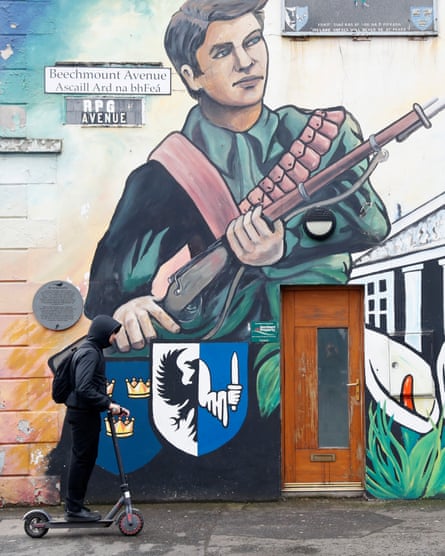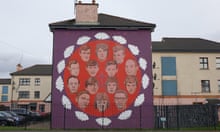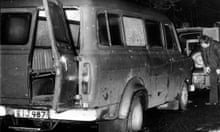The scenes are like a time warp. Masked men in camouflage gear march through city centres while youths gather petrol bombs to hurl at police. Hoax bomb alerts seal off streets. Fresh murals celebrating gunmen appear on walls. News headlines report so-called punishment attacks.
If Rip van Winkle had dozed off when the Good Friday agreement was signed in 1998 and woke up now, 25 years later, he may not have noticed much difference in the presence of paramilitaries in Northern Ireland.
A quarter of a century after the end of the Troubles, republican and loyalist paramilitary groups still recruit, still march, still intimidate and, on occasion, still kill.
The conflict is over. The Provisional IRA is fading into history and loyalist groups do not menace Catholics. But a less deadly form of paramilitarism remains woven into society, reflecting and aggravating political dysfunction.
Dissidents republicans are expected to parade through Derry on 10 April, raising fears of a repeat of previous Easter week rallies that led to clashes between youths and police. Last month, MI5 restored the terrorism threat level from substantial to severe – meaning an attack is highly likely – just a year after it was lowered from severe for the first time in 12 years. Detectives are still hunting the New IRA gunmen who seriously injured DCI John Caldwell in Omagh in February.

Meanwhile, rival factions of Ulster Defence Association and Ulster Volunteer Force wage turf battles over drugs and racketeering, a near-weekly saga of threats, beatings and expulsions that on occasion turn lethal. The UDA and UVF have also made ominous threats and hoax attacks over post-Brexit trading arrangements.
Paramilitaries affect 15-30% of Northern Ireland’s population, the department of justice has estimated. It adds up to a “cruel storm”, Simon Hoare, chair of Westminster’s Northern Ireland committee, told a recent hearing. The MP lamented that police had not extinguished groups he said were cover for organised criminals. “When does the PSNI draw the line on transitioning and just do a crackdown and annihilation?”
No one in Northern Ireland is expecting – and not all want – paramilitaries to be obliterated. Their roots are too deep, too tangled.

“You pay them and they leave you alone. I don’t like it but that’s life,” said one fast-food restaurant owner in Newtownards, a town outside Belfast. A pensioner on the Shankill Road, a Belfast loyalist heartland, said so-called punishment attacks continued: “They’re still ganging up on people.” A former UDA member in east Belfast grumbled that his former comrades were “all about the rackets” but he valued the group’s deterrence factor. “You don’t see Catholics moving in.”
The Good Friday agreement did not establish a formal process to phase out paramilitary groups. It was hoped they would fade away with the decommissioning of weapons, a peace dividend and time. Some did. Provisional IRA members retired or found other roles, in Sinn Féin and the republican movement. The Red Hand Commando largely dissolved. UDA members became community activists.
But other factions persisted and evolved. Some did so while pretending to transition, said Paul Smyth, a spokesperson for the Stop Attacks forum. “The rationale was to offer them resources and jobs, bring them into civil society, but some became very astute at having two personas. Those who did transition were replaced by those who were much more involved in criminality. It’s enormously depressing.”

For dissident republicans the main goal is to keep alive a flame of physical force republicanism they date from the 1916 Rising, when republicans launched an armed insurrection against British rule. Groups such as the Real IRA, Continuity IRA and now the New IRA have waged sporadic attacks on security forces. They have negligible support and limited capacity to escalate attacks but their actions unsettle the police and wider society.
Paramilitaries seek to exert control by assaulting supposed transgressors in working-class communities. Republicans tend to shoot victims, while loyalists tend to beat them, said Smyth. Social media posts that condone or trivialise the attacks reflect a “societal shrug”, he said. “People here feel this is how paramilitaries respond to antisocial behaviour.”
For factions of the UDA and UVF the prime motivation is money. In addition to drugs and racketeering, they use loan sharking to lock vulnerable families into a debt trap. Some stake out food banks to identify targets, the BBC reported. A feud has triggered more than a dozen attacks in north County Down since March.
“It’s a lucrative business, so why would they give it up?” said Brian Anderson, a Methodist minister who runs the East Belfast Mission. Politicians, churches and other organisations should be more robust in challenging paramilitaries, he said. “Trafficking drugs and people is wrong, we need to say that. We’ve not been able to coalesce around an agreed agenda for the benefit of the community.”
Unionist anxiety over Brexit’s impact on Northern Ireland has bolstered loyalist paramilitary pretensions to defend the region’s British identity, said Anderson. “It’s emboldened them – they still have a role.”
Chris Hudson, a Unitarian minister who helped to broker the 1994 loyalist ceasefire, said Brexit and political drift had unravelled progress. “We’ve moved backwards. We have to engage again with those in paramilitary organisations that want to transition. We need to finish the job.” Asked if 25 years was not long enough, Hudson said: “I don’t think it is. It’s an ongoing process. We don’t know what date it all ends at.”










